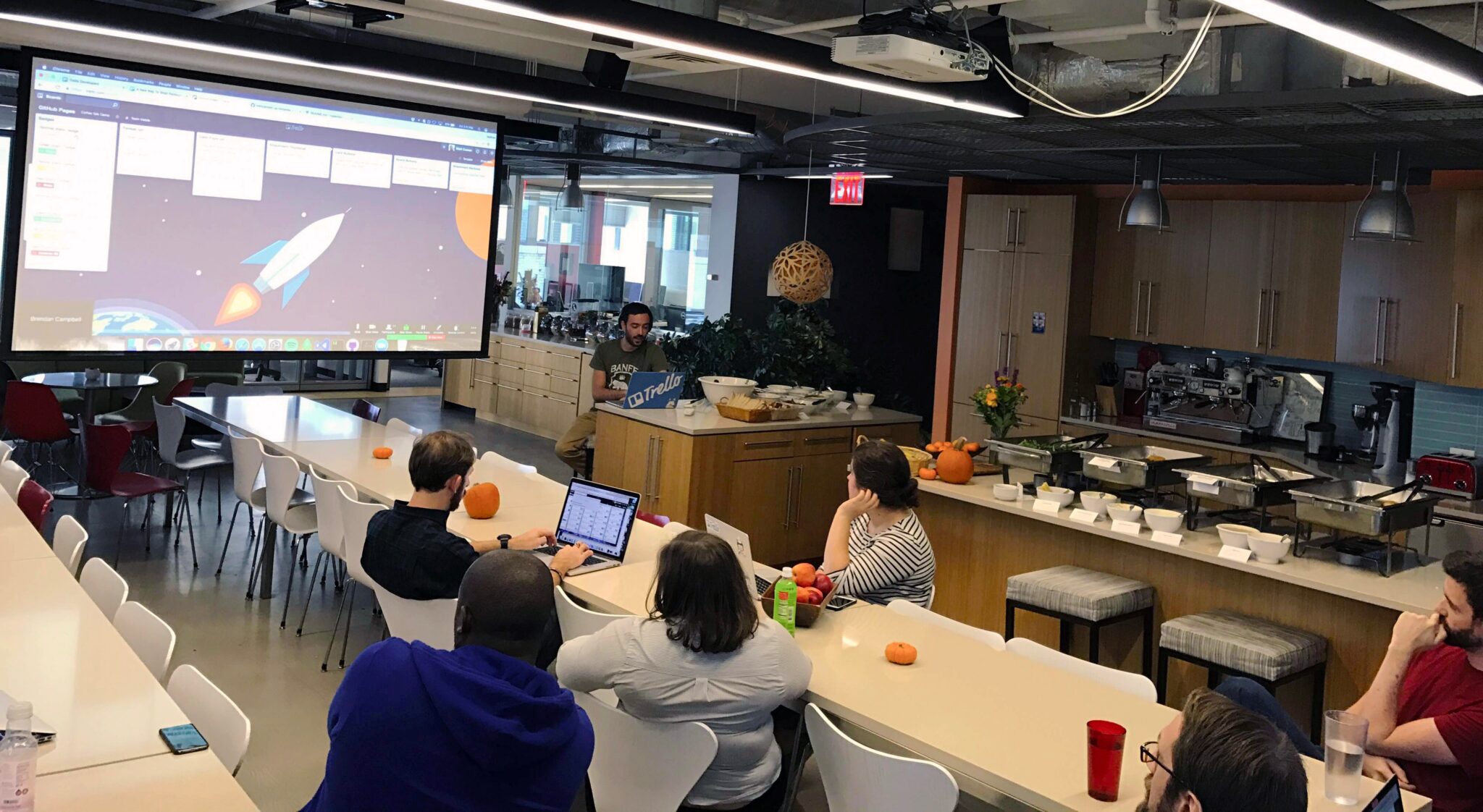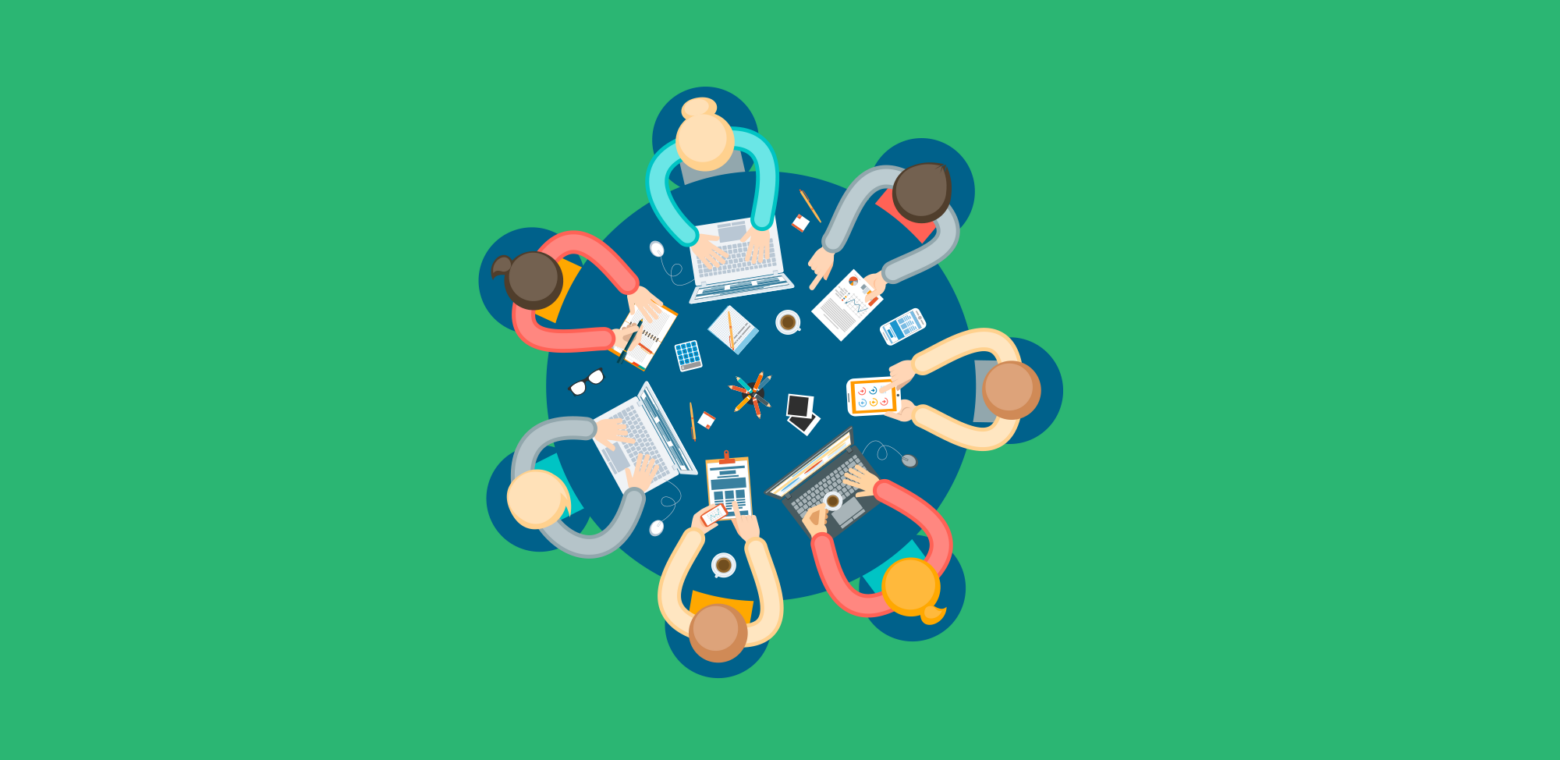It’s Friday afternoon: Do you know where your coworkers are?
If they’re Trello employees, since August 2016 the answer has likely been: at Coffee Talks. Coffee Talks (name inspired by MailChimp) are a Friday afternoon event where Trellists share their specialist knowledge about Trello the app or Trello the company with each other in the form of thirty minute to one hour presentations.
Knowledge management is a big deal for organizations that want to continue to innovate and grow. Studies have shown that Fortune 500 companies lose at least $31.5 billion a year by not sharing knowledge among employees.
And while training manuals and protocols are now a core part of every company’s library, it may be that these approaches don’t consider how people like to learn, which we’ve discovered is through collaboration and a bit of humor.
The Coffee Talk knowledge share project has averaged around 40% attendance from the company each week, has created a low-pressure space for people to learn about their colleagues’ work or share their own, and has opened up an internal event for newer hires to practice their public speaking skills. If you’re interested in any of those benefits, I highly recommend implementing something similar at your own workplace.
Why are they useful?
Coffee Talks came out of a period of rapid growth at Trello. We’ve just hit 100 employees, and are finally at the size where not everyone at the company knows what everyone else is working on—particularly given that two thirds of our employees are remote, and so aren’t as likely to overhear other folks discussing work in passing.
The influx of new hires means that information that used to be passively shared as ambient institutional knowledge is no longer always known. As a result, having a regular space for people to share information about their work on the application or in the company allows for some of that knowledge transfer and connection-building to continue happening in a low-stress way.

“I think it can be easy for forget that some concepts that are so familiar to one group at a company can be completely foreign to everyone else,” said Daniel LeCheminant, one of Trello’s developers. Coffee Talks give a space to cross-pollinate.
Recordings of each week’s Coffee Talk ensure that future new hires—or people who aren’t able to attend a particular week’s talk—can reference the information as needed. This means that if new hires want to know what we mean when we talk about “meta pages,” or why the app is written in JavaScript, or even how our sales pipeline works, they can go learn about that topic—and familiarize themselves with the people or departments that do that work.
Getting buy-in
The three most important parts of the Coffee Talk process at Trello have been:
- Making the mission of the talks clear
- Making them visible to the company
- Getting buy-in from people in departments across the company
For us, the mission statement of the talks has become “specialized knowledge for non-specialist audiences.” An elevator pitch/mission statement is critical to getting a new initiative off the ground—people can quickly grasp the idea without needing to read through all of the previous talk titles. Plus, as we bring on more employees, that pitch helps us explain what the talks are to new hires in order to encourage them to attend or pitch their own.
Currently, our Coffee Talk pipeline is managed via a Trello board (of course). Individual Trellists nominate themselves or each other to give a talk, and the specifics of what that will be (and whether it’s a good fit) are hashed out in the card comments, Slack chats, and video calls.
In making sure talks are going to be informative, we ask two central questions of the proposed topic:
- Is the information something that can be explained to an audience that isn’t immersed in that professional area all day?
- Is the talk directly related to the work we do at Trello?
In terms of buy-in, we’ve found that consistent promotion is super-helpful in rallying busy Trellists to attend the talks. It pays to be noisy!
We promote each talk three times a week in a Slack channel populated by regular Coffee Talk attendees, two times a week in our main all-company channel, and one time a week in our low-noise, high-signal #Announcements channel, right as a talk is beginning. We find that this helps strike the right balance between being visible without being so annoying that people tune out our announcements.
We make sure to link to the Trello card for the talk during promotion, so that interested parties can ask questions in the comments before the presentation. The talks themselves happen at 2pm ET on Friday afternoon—we found that this time maximized the ability of our West Coast American distributed team members to attend.
I’m in! What do I need to think of in terms of logistics?
Trello is based in new york, with 65% of our employees distributed throughout the world. In our HQ in Manhattan, we gather in our communal kitchen for Coffee Talks (with the presenter if they’re also HQ, and with them on a drop-down projector screen if they’re remote).
For in-person attendees: Having an audience available, if possible, makes a big difference: our presenters have reported that having an audience to respond to and engage with makes a big difference in terms of how they feel about the presentation. Coffee Talks are supposed to have a safe, welcoming vibe, and it’s easier to have that when you can see people laughing at your jokes.
For remote attendees: For remotely distributed coworkers, we fire up a Zoom meeting on a laptop set up facing the presenter (if in HQ) or the kitchen audience (if the presenter is remote). This allows them to have a clear view. The presenters, whether in HQ or remote, use a headset microphone in order to talk and ensure the best sound quality for online attendees and the recording. Zoom handles the recording.
Our kitchen is wired for sound (helpful for parties, too!) and we set the host computer to route remotes employees’ sound through those speakers, allowing them to ask questions by speaking up.
We’ve also started endowing a remote attendee as the MC for the Q&A portion of the talk, as well—people drop their questions in our dedicated Coffee Talk Slack channel, and they’re read aloud to the group. Having them come from Slack helps cut down on the amount of times we have to shout “Repeat the question!” at the presenter.
When we’re done, we upload a recording of the talk to the Trello card for the talk, and move it to a “done” list. This keeps them in an orderly archive for future viewing.
If you’re interested in running Coffee Talks knowledge share at your own office, I’ve set up a copy of our Coffee Talks board here. Check it out, test it out, and let us know what you think.
